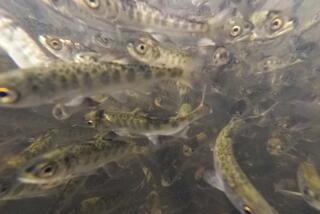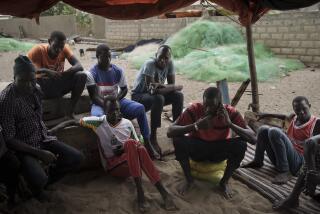Activists seeking to stop illegal fishing gather in South Africa
JOHANNESBURG, South Africa -- Illegal fishing off Africa -- often by ships from wealthy nations like South Korea -- costs the continent millions of dollars a year, with poor West African nations among the hardest hit.
Activists and environmental organizations are calling for new measures to prevent illegal fishing, including steps to make vessels -- and tuna fish -- more traceable, at a week-long meeting of the International Commission for the Conservation of Atlantic Tunas, which began Monday in Cape Town.
A single tuna fish can sell for thousands of dollars -- one bluefin tuna reportedly sold for $1.76 million at auction this year -- and rising demand in Japan, which consumes 80% of the world catch, has put world tuna stocks under severe pressure, according to Elizabeth Wilson of the Pew Charitable Trusts’ environmental wing.
Wilson said in an interview with The Times that fishing quotas in the Atlantic designed to help the devastated tuna stock recover were meaningless without strong measures to prevent widespread illegal fishing. Members of the Pew Charitable Trusts were attending the meeting as observers.
“If quotas are set and they’re not adhered to, they do no good at all,” Wilson said.
The conservation commission has introduced stricter fishing quotas, but a scientific study of tuna fishing in the Atlantic found that between 2008 and 2011 the illegal catch in the Atlantic exceeded the catch limit by 57%. Another report suggested that illegal tuna fishing exceeded the quota by 141% in 2010.
A 2012 report on illegal fishing off Africa by the Britain-based nonprofit Environmental Justice Foundation estimated the worldwide value of illegal fishing at between $10 billion and $23.5 billion a year. Illegal fishing cost Sierra Leone nearly $30 million a year, the report said.
The ICCAT, with 47 member countries plus the European Union, is an intergovernmental group responsible for managing the fishing of tunas in the Atlantic but has been sharply criticized for its tendency to place commercial fishing interests above conservation and sustainability values, with Atlantic tuna stocks falling to nearly 60% below the 1970 level by 2008.
“We call it the International Conspiracy to Catch All Tuna, so that will tell you how bad it has been at its job,” says a comment by Greenpeace on its website.
The Cape Town meeting follows a series of illegal fishing scandals off West Africa recently, two of which involved vessels owned or operated by South Korea’s largest tuna fishing company, Dongwon, which owns the StarKist brand.
Two tuna fishing vessels owned or operated by Dongwon -- the Premier and Solevant -- were caught fishing illegally off Liberia in 2011 and 2012, respectively, and the company paid a $2 million settlement to the Liberian government in May to have its ships released, according to Liberian authorities. The Liberian government accused Dongwon of forging letters to try to get fishing licenses from other African countries after it was caught, which the company denied.
Another South Korean vessel, the Nine Star, owned by the Seokyung Corp., was seized by Liberian authorities in June for alleged illegal fishing, and a sister ship owned by the same company, the Five Star, had been fined by Sierra Leone for illegally transferring fish at sea, according to Stop Illegal Fishing, a Botswana-based working group of the African economic development organization, NEPAD, the New Partnership for African Development.
In another case in September, a South Korean flagged vessel, the Kum Woong 101, was caught operating illegally in Sierra Leone’s waters, according to NEPAD.
Wilson said there were indications that South Korean companies were among the major offenders involved in illegal fishing off Africa. Activists will be watching to see if the ICCAT meeting puts South Korean vessels caught fishing illegally off West Africa on a list of vessels banned from operating. But Wilson said government representatives often acted to protect vessels caught fishing illegally.
Pew and other groups are calling on the ICCAT meeting to require all fishing vessels to carry a permanent identification number, like an automobile registration plate, so that ships cannot change names or flags to avoid sanctions for fishing illegally.
“It’s really easy to just change the name of a boat and paint it over, and it’s also easy to change the country it’s flagged under. Some vessels repeatedly change names and flags,” Wilson said.
“This illegal fishing is a real problem. It’s definitely something that countries are starting to take more seriously and it’s something that we are hoping ICCAT will be looking at,” Wilson said.
Pew and others are also calling on the commission to implement an electronic catch documentation system that digitally records each tuna caught in real time via the Internet, making it more difficult for fishing vessels to pass off illegally fished tuna in ports. The system is due for implementation in March, but some states are pressing to move the deadline back, according to Wilson.
In addition, Pew Charitable Trusts, the World Wildlife Fund and others are calling on the commission to stick to a recommendation by scientists not to raise current tuna quotas in the Atlantic. It comes from a standing scientific committee commissioned by ICCAT to make recommendations on tuna stocks and quotas.
Environmental organizations are also calling on the commission to ban fishing of the critically endangered porbeagle shark.
ALSO:
Mexico: Family of eight stabbed to death in Juarez
French president arrives in Israel; Iran high on agenda
Video shot in Philippines displays the power of Typhoon Haiyan
Twitter: @latimesdixon[email protected]
More to Read
Sign up for Essential California
The most important California stories and recommendations in your inbox every morning.
You may occasionally receive promotional content from the Los Angeles Times.










